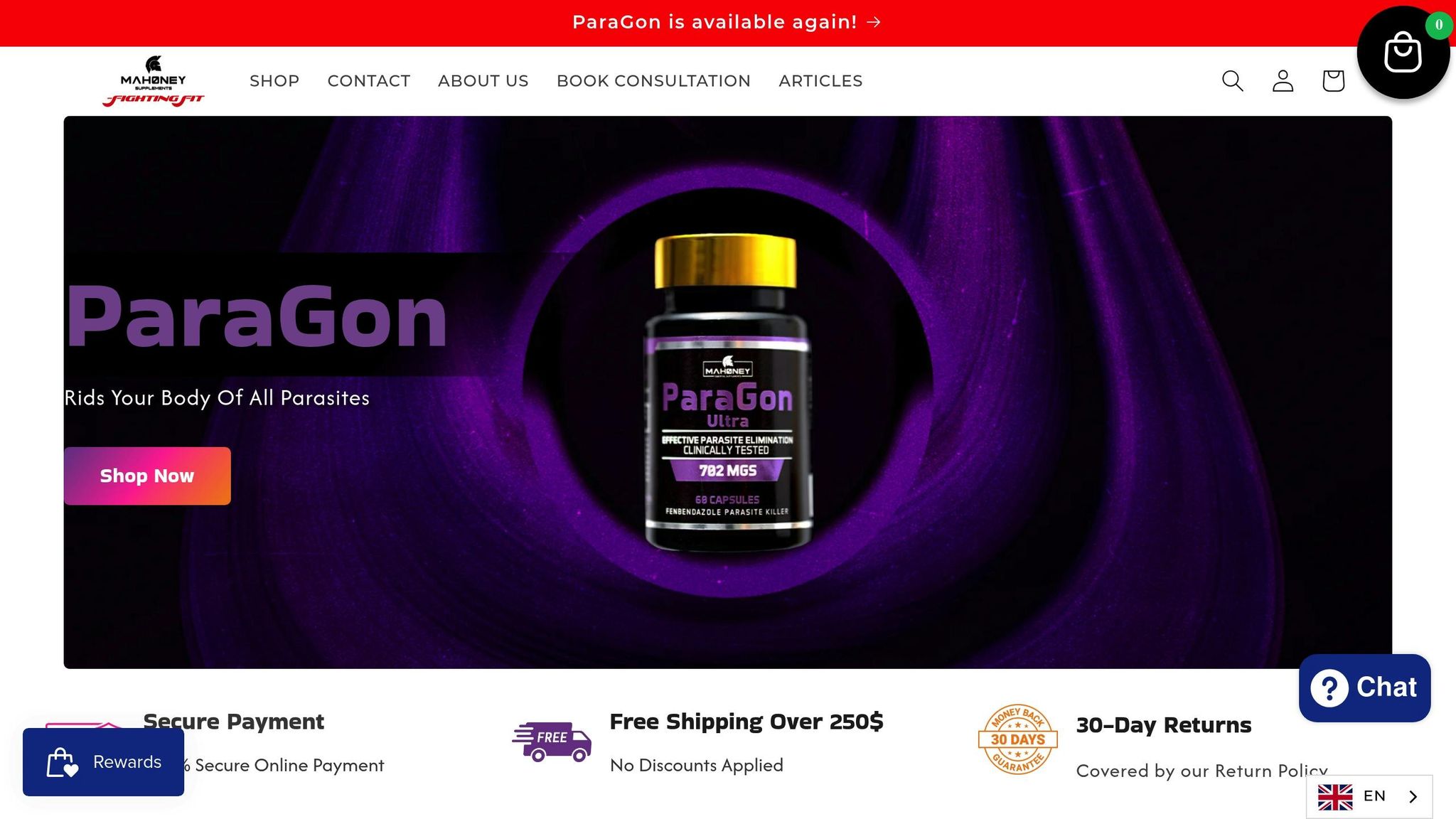
How Fasting Supports Natural Detox
Share
Fasting helps your body’s natural detox systems work more effectively by giving them a break from constant digestion. It triggers processes like autophagy (cellular cleanup), supports liver health, and improves kidney and gut function. Here’s what you need to know:
- Autophagy: Fasting recycles damaged cells, reducing waste and guarding against age-related illnesses.
- Liver Benefits: Encourages fat burning, reduces inflammation, and improves liver enzyme levels.
- Kidneys & Intestines: Promotes hydration, gut healing, and better waste elimination.
- Types of Fasting: Options include intermittent fasting (e.g., 16:8 method), extended fasting (24+ hours), and juice fasting, each with unique benefits and challenges.
To fast safely, consult a healthcare provider, stay hydrated, and break your fast with nutrient-rich, easily digestible foods. Supplements like TUDCA, NAC, and milk thistle may enhance liver support during fasting. Always prioritize safety and listen to your body.
Detox effects during fasting with Dr. Robin Mesnage | Buchinger Wilhelmi

How Fasting Improves Your Body's Detox Systems
When you fast, your body shifts gears from digesting food to activating cellular cleanup processes that support its natural detoxification systems. This shift doesn't just clean up at the cellular level - it also brings specific benefits to key organs.
Autophagy: The Body's Cellular Cleanup Crew
Fasting kicks off autophagy, a natural process where cells recycle damaged components and clear out waste.
"Autophagy allows your body to break down and reuse old cell parts so your cells can operate more efficiently. It's a natural cleaning out process that begins when your cells are stressed or deprived of nutrients."
When nutrients are scarce, cells enter survival mode and start repurposing worn-out parts. Animal studies suggest that autophagy begins after 24 to 48 hours of fasting. Interestingly, research has shown that cells from centenarians tend to exhibit higher levels of autophagy compared to those in younger seniors around the age of 75.
"Fasting is [the] most effective way to trigger autophagy."
This process not only clears cellular waste but also helps guard against age-related illnesses. And while autophagy works at the cellular level, fasting also provides direct benefits to organs, especially the liver.
How Fasting Supports Liver Health
When you fast, your liver shifts its focus from digesting food to detoxifying the body. This change encourages liver cell regeneration, reduces fat accumulation, and improves insulin sensitivity. In response to nutrient deprivation, the liver releases hormones that steer your metabolism toward burning fat, which further aids detoxification.
A meta-analysis of 417 patients with non-alcoholic fatty liver disease showed that fasting significantly improved liver enzyme levels. Even modest weight loss during fasting was linked to reduced fat buildup, inflammation, and fibrosis in the liver. Additionally, fasting increases bile production and lowers systemic inflammation, both of which enhance the liver's detoxifying abilities.
Benefits for Kidneys and Intestines
Fasting doesn’t stop at the liver - it also benefits other detox organs like the kidneys and intestines. Staying hydrated during fasting is crucial, as water helps optimize the body's natural detox processes.
For the intestines, the break from constant food digestion allows time for healing and rebalancing. Fasting can soothe inflammation in the digestive tract and address issues like bloating or irregular bowel movements. During fasting, the migrating motor complex - a cleansing wave in the digestive system - removes undigested material. Since the gut lining can repair itself within days and houses 75% of the immune system, this downtime is essential for maintaining overall health.
"The body is not made to be eating all day."
Even a simple time-restricted fasting routine, such as fasting for 16 hours daily, can give your digestive system the rest it needs to clear waste and maintain a healthy balance of gut bacteria.
Different Types of Fasting for Detox
Fasting methods vary in their detox benefits, and understanding the options can help you choose one that fits your lifestyle and goals. Let’s break down three popular fasting methods and how they impact detox.
Intermittent Fasting
Intermittent fasting alternates between eating and fasting periods, making it a flexible and sustainable option for many. Common approaches include the 16:8 method, where you fast for 16 hours and eat during an 8-hour window, and the 5:2 method, which involves consuming only 500 calories on two non-consecutive days each week.
This method may enhance insulin sensitivity, helping your body manage blood sugar more effectively. It also gives your digestive system regular breaks, which can support your liver's detox functions.
"Choosing a fasting method is a personal decision that should support your current lifestyle while helping you reach your fitness goals."
Adapting to intermittent fasting typically takes two to four weeks, during which you might experience hunger, fatigue, or even mental fog. These side effects usually improve as your body adjusts.
Extended Fasting
Extended fasting, which lasts 24 hours or more, can lead to deeper cellular cleanup through processes like autophagy. However, it’s not for everyone and requires careful planning.
A study involving 768 participants fasting for at least 48 hours found that 72% experienced side effects such as hunger, fatigue, insomnia, and dizziness. These challenges highlight the importance of approaching extended fasting cautiously, especially if you have health conditions like diabetes, hypertension, or epilepsy.
For those interested in trying extended fasting, starting with intermittent fasting can help your body adjust to the metabolic changes. Staying hydrated is crucial - drink water with a pinch of salt or use electrolyte tablets during the fasting period.
Juice Fasting
Juice fasting focuses on liquid nutrition by consuming only fresh fruit and vegetable juices while avoiding solid foods. This method provides vitamins, minerals, and antioxidants that may aid detox. For example, chlorophyll from leafy greens is thought to help cleanse the liver and intestines.
A 2017 study showed participants lost up to 2.6 pounds after a 3-day juice cleanse, though most regained the weight after resuming normal eating habits. However, juice fasting has its downsides. It lacks fiber and protein, essential nutrients for overall health, and can lead to blood sugar spikes.
"Juicing fruits and vegetables removes the fiber, so we miss out on its benefits, like helping to regulate blood sugar, manage cholesterol, and support gut health." - Bethany Moran, RD
Juice cleanses are calorie-restricted and may pose risks, including an increased likelihood of health complications and eating disorders. Public health experts caution against relying on juice-only diets, emphasizing that they should be short-term and medically supervised if attempted at all.
"Generally there is no quick fix to improve health and for most of us, our liver and kidneys do a good job at detoxing the body. Fruit and vegetable juices can be part of a healthy balanced diet - UK Public Health England recommends that a small glass of fruit juice of 150ml a day counts toward your '5 a day', but no more as juices are high in free sugar." - Megan Mehnert
Final Thoughts
Selecting the right fasting method depends on your health, lifestyle, and personal goals.
"Weight loss is never a one-size-fits-all approach. Intermittent fasting may be sustainable for some people, while others find that this approach just isn't for them." - Julia Zumpano, RD, LD
Always consult a healthcare provider before starting any fasting regimen to ensure it’s safe and effective for you.
sbb-itb-9616115
Step-by-Step Guide to Safe Fasting
Fasting offers benefits like liver and cellular detoxification, but preparation is essential to ensure it's done safely and effectively. Following a structured plan helps your body adjust gradually, reducing risks and discomfort.
How to Prepare for a Fast
Preparation is the foundation of a successful fasting experience. Start by consulting a healthcare professional, especially if you have conditions like diabetes, heart disease, or a history of eating disorders. A registered dietitian can help tailor a plan that suits your health needs and goals.
In the days leading up to your fast, shift your diet toward whole, unprocessed foods and begin reducing meal sizes. If fasting is new to you, start with shorter durations (12–14 hours) and slowly extend the fasting period as your body adapts [36,37].
Timing is also crucial. Pick a period when you can rest and avoid stress. Fasting during hectic workdays or social events can make the experience harder, so consider starting over a weekend. Hydration is key - drink plenty of water in the days before fasting to help prevent fatigue and headaches.
"Fasting helps our body utilize its own cleansing and healing capacities to restore health and vitality." - Carrie Demers, MD
Safety Tips During Fasting
Listening to your body and staying hydrated are vital during fasting. Keep an eye on your hydration levels - if your urine is darker than usual, increase your water intake.
For beginners, limit fasting periods to 24 hours or less. If you feel unwell, have a light, healthy snack on hand. While mild fatigue, hunger, or irritability can be expected, feeling genuinely unwell is a sign to stop. Avoid heavy exercise during fasting; instead, opt for light activities like walking or gentle stretching to allow your body to focus on detoxification [36,38]. Relaxing activities like meditation or reading can also help reduce stress.
Know when to stop. If you experience extreme fatigue, weakness that interferes with daily tasks, or unexpected sickness, it’s important to end your fast immediately [36,39]. Some groups should avoid fasting altogether, including pregnant or nursing women, children and teens, older adults with frailty, individuals with immunodeficiencies, those with current or past eating disorders, people with dementia, or anyone with a history of traumatic brain injury.
"Intermittent fasting contrasts with the normal eating pattern for most Americans, who eat throughout their waking hours... If someone is eating three meals a day, plus snacks, and they're not exercising, then every time they eat, they're running on those calories and not burning their fat stores." - Mark Mattson, Johns Hopkins Neuroscientist
Once your fast is complete, how you reintroduce food is just as important as the fast itself.
How to Break a Fast Properly
Ending your fast the right way is critical to avoid overwhelming your digestive system after its rest. Start by rehydrating with herbal tea or lemon water, then replenish electrolytes with salted water or an electrolyte powder [40,41].
Begin with gentle, easily digestible foods like smoothies, dates, or soft starchy vegetables. Avoid foods that are tough on digestion, such as sugary snacks, processed items, greasy or heavy meals, dairy (if you’re sensitive to it), spicy dishes, caffeine, large portions of meat, and alcohol. These can cause cramping or nausea.
Gradually increase portion sizes over several hours or even days, depending on how long you fasted. Focus on whole, minimally processed foods to support your body’s ongoing detoxification process.
"The specific instructions depend on the type of fast you follow as shown in our guide. However, the general recommendations include hydrating your body and replenishing lost electrolytes, starting with easily digestible foods, and increasing your portions gradually."
Taking the time to break your fast properly can make a big difference in how you feel afterward and helps maintain the benefits of fasting, easing the transition back to your regular eating routine.
Natural Supplements That Support Detox During Fasting
Fasting naturally activates the body’s detox processes, but adding specific supplements can help support detoxification and organ health during this time.
Supplements for Liver Support
The liver takes on a heavy workload during fasting, so giving it extra support can make a big difference. Supplements like TUDCA, NAC, and milk thistle are known for their liver-protective benefits.
- TUDCA: This supplement promotes bile flow and helps protect liver cells. Research shows that taking 1,750 mg of TUDCA daily for four weeks can improve muscle and liver insulin sensitivity by about 30%. Another study found it could boost bile flow by as much as 250%. For better absorption, TUDCA is best taken with food.
- N-acetylcysteine (NAC): NAC supports the liver by replenishing glutathione, a key antioxidant. With over 2,000 studies on PubMed as of May 2023, NAC has strong scientific backing for its role in liver health.
- Milk thistle: Known for its active compound silymarin, milk thistle provides antioxidant protection, may help regenerate liver tissue, and reduce inflammation. The World Health Organization also recognizes its liver-protective properties.
Parasite Cleansing with ParaGon

For those interested in parasite cleansing during fasting, ParaGon by Mahoney World LLC offers a blend of natural ingredients traditionally used to support gut health and combat parasites. However, it’s important to note that the effectiveness of such supplements has not been conclusively proven.
"If you have a parasitic infection, the best way to treat it is with medication, not supplements." - Beth Czerwony, RD, LD, Registered Dietitian
Mahoney Supplements, the maker of ParaGon, has a 3.8/5 rating on Trustpilot, with some users reporting positive experiences when incorporating these products into their wellness routines. Still, these supplements should not replace conventional medical treatment for parasitic infections.
Immune Support with B17
Fasting can sometimes put stress on the immune system. B17 (Laetrile), another product from Mahoney World LLC, is marketed to help maintain immune health, support detox efforts, and enhance overall wellness during fasting. While B17 is often included in detox protocols, it’s crucial to approach its use with care and proper research.
It’s worth noting that about 1 in 5 cases of liver injury in the U.S. has been linked to supplements. This underscores the importance of consulting with a professional before adding new supplements to your routine.
"Unfortunately, these products are not regulated by the FDA, and thus are not uniform and have not been adequately tested in clinical trials." - Tinsay Woreta, M.D., Johns Hopkins hepatologist
When using supplements, prioritize high-quality, third-party tested options. Start with small doses to gauge your body’s tolerance, and always pair supplements with safe fasting practices, proper hydration, and a careful refeeding process.
Conclusion: Using Fasting as a Complete Detox Method
Fasting is a scientifically backed way to support your body's natural detox processes. Studies reveal that 84.4% of individuals with pre-existing health concerns experienced improvements during medically supervised fasting periods of 4 to 21 days, with adverse effects reported in fewer than 1% of cases. These findings highlight the potential of fasting when done correctly.
The key to successful fasting lies in tailoring it to your needs. For instance, young adults (ages 18–25) might benefit from a 16/8 fasting schedule, while individuals over 60 could find a gentler 12/12 plan more suitable, paired with nutrient-rich foods and plenty of hydration.
Medical supervision is crucial, especially for those with underlying health conditions or those new to fasting. As Johns Hopkins neuroscientist Mark Mattson notes:
"Many things happen during intermittent fasting that can protect organs against chronic diseases like type 2 diabetes, heart disease, age-related neurodegenerative disorders, even inflammatory bowel disease and many cancers".
To enhance the detox benefits of fasting, consider incorporating natural supplements. Options like TUDCA and NAC from Mahoney World LLC can help support liver health, ParaGon aids in gut detoxification, and B17 helps strengthen immune function.
To maximize the benefits, focus on these essentials: select a fasting schedule that fits your lifestyle, stay hydrated, use high-quality supplements to support detox organs like the liver, and break your fast with nutrient-dense meals. Remember, your body already has sophisticated detox systems in place - fasting simply allows these systems to function more efficiently by giving them the energy and space they need.
Start gradually, listen to your body's signals, and work with a healthcare professional to create a personalized fasting plan. This approach can encourage cellular repair, reduce inflammation, and support your body's natural detoxification processes.
FAQs
How does fasting activate autophagy to support healthy aging?
Fasting activates autophagy, a process where cells clean out damaged parts and recycle them for energy. As we get older, this process slows down, leading to a buildup of harmful proteins and malfunctioning organelles. This buildup can contribute to issues like heart disease and neurodegenerative conditions. By kickstarting autophagy, fasting helps clear out this cellular clutter, promoting healthier organs and potentially supporting a longer, more active life.
Studies indicate that fasting-induced autophagy not only boosts cellular health but may also lower the risk of age-related diseases. This natural "cellular cleanup" system plays a key role in maintaining energy, vitality, and overall well-being as the years go by.
What are the possible side effects of extended fasting, and how can they be safely managed?
Extended fasting can lead to side effects like headaches, dizziness, fatigue, mood swings, and even trouble sleeping. These symptoms often happen as your body adapts to going without food for an extended time. There's also the risk of dehydration and missing out on essential nutrients if you're not careful.
To minimize these issues, make sure to drink plenty of water throughout the fasting period to stay hydrated. When breaking your fast, ease back into eating with small, easily digestible meals to avoid upsetting your stomach. If you have existing health conditions or concerns, it’s a good idea to talk to a healthcare professional before attempting extended fasting.
How do I choose the best fasting method for my health and lifestyle?
Choosing the right fasting method hinges on your health, lifestyle, and personal goals. Among the popular choices is Intermittent Fasting (IF), which includes methods like the 16/8 approach - 16 hours of fasting followed by an 8-hour eating window - or alternate-day fasting. These methods can help with weight management, improve metabolic health, and support overall wellness. However, they aren't a one-size-fits-all solution and may not be ideal for individuals with certain conditions, such as diabetes or heart disease.
It's crucial to consult a healthcare provider before starting any fasting routine, particularly if you have existing health concerns. Fasting can sometimes result in issues like low blood sugar or nutrient deficiencies. Selecting a method that complements your health needs and fits smoothly into your daily life increases the likelihood of staying consistent and reaping the benefits over time.
